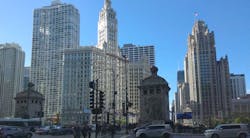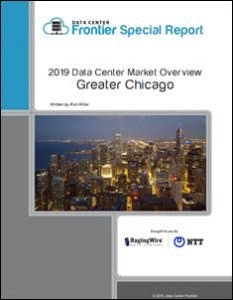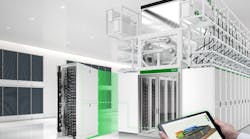Chicago Business Environment Ready for Data Center Expansion
We continue our series of stories on the leading geographic markets for data center space with a report on the Greater Chicago data center market. Data Center Frontier is partnering with DatacenterHawk to provide in-depth market reports on each city we profile. This excerpt explores the Chicago business environment, including factors like power, hazard risk, incentives, connectivity and more.
Download the full report.
New players continue to enter the Chicago market, while incumbent providers are adding space to accommodate future demand. RagingWire/NTT Data Centers and Iron Mountain are each building large facilities in Suburban Chicago, where NYI (New York Internet), Element Critical and SBA Communications have entered the market through smaller deals. What are the business factors that companies must consider in choosing Chicago as a data center location? Here’s a closer look at key criteria.
Connectivity
An abundance of fiber providers and several Internet exchanges make Chicago a hub for content delivery services to a large portion of the American Midwest. Demand in the Downtown Chicago market will continue to be driven by connectivity, inter-connection and access to the city’s financial exchanges and business customers in the central business district. Users locate their data centers in downtown Chicago in spite of high costs, because they require low-latency connectivity. Data center providers understand this need and have built accordingly, tapping the fiber-ring infrastructure serving Chicago’s Board of Trade, Mercantile Exchange, and all of the major financial enterprises with offices downtown.
On July 1, 2015, local Chicago politicians approved levying a 9% tax on local consumers of subscription cloud services such as Netflix, Spotify, and Xbox Live. Because enforcement of this so-called “Netflix Tax” on consumers will also add a compliance burden on the companies that deliver the services, data center providers should be aware of these potential added costs.
Power
The Illinois General Assembly passed legislation in 1997 that deregulated the state’s electricity markets. The law separated the business of generating and selling power from the business of transmitting and distributing it. This forced Commonwealth Edison (ComEd), the monopoly supplier of electricity in Northern Illinois, to become a subsidiary of Chicago-based Exelon Corporation, one of the nation’s largest power utility companies. ComEd sells and distributes the electricity generated by Exelon’s plants that use a diverse mix of petroleum, natural gas, nuclear, and non-hydro renewable sources.
The Chicago City Council is getting ready to renegotiate its franchise agreement with ComEd, the main energy provider, for the first time since 1992. The current agreement is set to expire in 2020. The renewal may bring about the risk of higher energy prices for businesses in coming years, as officials contemplate higher franchise fees to address the city’s budget challenges. But a new deal might also improve the reliability of the electric grid and environmental impact of electricity. City officials will be pushing ComEd to align with clean-energy objectives.
New projects that will invest at least $250 million and create 20 full-time high-paying jobs will receive exemptions on state and local sales taxes on equipment purchases for 10 years.
Hazard Risk
The Chicago market has a low risk for natural disasters. Hurricanes are non-existent, and it is rare that seasonal storms result in flood or tornado damage that threaten the Chicago business environment. The United States Geological Survey (USGS) notes that while the New Madrid fault line runs through southern Illinois, the small earthquakes caused by it have limited effect on Chicago. In the past 100 years there have been eight earthquakes in northern Illinois registered by the USGS, but none have caused any significant damage to the Chicago area.
Economic Development and Incentives
The QTS Chicago data center is the first data center to receive UL 3223 certification. (Photo: Rich Miller)
The State of Illinois enacted a new tax incentive for data center operators in 2019, making the Chicago business environment even more attractive for colocation providers. New projects that will invest at least $250 million and create 20 full-time high-paying jobs will receive exemptions on state and local sales taxes on equipment purchases for 10 years. Development in low-income areas can also receive a 20% income tax break. Another potential incentive is for data center providers to leverage the Illinois Economic Development for a Growing Economy Tax Credit Program (EDGE). Chances are low, however, as they must “demonstrate that if not for the Credit, the Project would not occur in Illinois.” In 2014, QTS made a deal to buy the former Chicago Sun-Times newspaper printing facility and convert it into a data center. The deal was endorsed by the Chicago Committee on Economic, Capital and Technology Development and granted a property tax break to reduce the property’s assessed value for 12 years—and save QTS $11.4 million over that period.
On top of the city’s relatively high property taxes, Chicago proper enacted a 10.25% sales tax in October 2015. The new rate is one of the highest in the United States and higher than 99.6% of other locales in Illinois. This is a key reason many data centers set up in the city’s western suburbs where the sales tax rates can be a quarter of a percentage point lower — a significant savings when considering the scale of investment required for a data center. Similar to other states with programs to revitalize economically depressed areas, Illinois’ Enterprise Zone Act enables qualifying businesses to receive a sales tax exception. Although data centers are not specifically mentioned as a qualified business, the Illinois Department of Commerce & Economic Opportunity’s website promotes commercial buildings in suburban Chicago’s Enterprise Zones for redevelopment as data centers (e.g., the AT&T Center in Hoffman Estates, Ill.).
The city of Chicago’s Data Center Express program also helps to identify areas in Chicago proper that are ripe for investment and redevelopment. Chicago’s South Side, an industrial area in decline for years, is experiencing a renaissance thanks to new data center developments. Real estate investment trusts (REITs) are actively redeveloping South Side buildings into world-class data centers due to the area’s proximity to downtown, robust electrical grid designed for large factories, and relatively inexpensive prices.
See the full report on the Chicago data center market to see a comprehensive supply overview of data center providers in the Chicago market.
Catch up on prior entries in this series on the Chicago Data Center Market Below:
- Chicago Colocation Market Sees Renewed Interest Amid New Economic Incentives, Projects
- Downtown Chicago Market Driven by Connectivity, Inter-connection & Access to Central Business District
- Chicago Data Center Development Activity Highlights for 2019
For full details on the Chicago data center market, we invite you to download the “Greater Chicago 2019 Data Center Market Overview,” sponsored by RagingWire Data Centers.
About the Author




